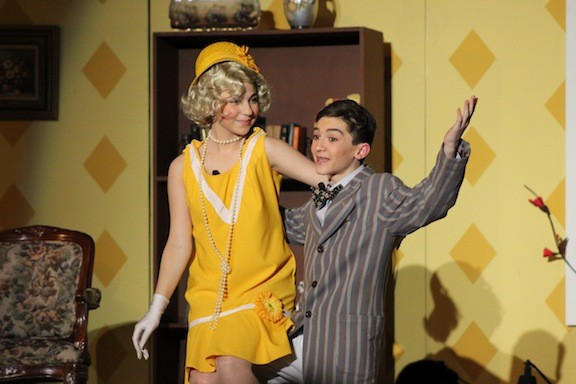Filichia Features: Sandy Wilson’s The Boy Friend Lives On
Filichia Features: Sandy Wilson’s The Boy Friend Lives On
 Living to be 90 represents a generous life span. Most of us, if we could, would sign a contract today if we were assured we’d be able to last that long. And yet, even after we see someone has attained nonagenarian status, we’re still saddened when he leaves us.
Living to be 90 represents a generous life span. Most of us, if we could, would sign a contract today if we were assured we’d be able to last that long. And yet, even after we see someone has attained nonagenarian status, we’re still saddened when he leaves us.
Nevertheless, Sandy Wilson, who died at 90 on Aug. 27 last week in his native England, will live on for quite some time. That’s because of the enduring nature of a show for which he wrote the book, music and lyrics: The Boy Friend.
At least Wilson was able to witness the 60th anniversary of the West-End-of-London opening last January. We’re only sad that he didn’t quite make the 60th anniversary of its opening on Broadway; that will take place on Sept. 30.
The Boy Friend is arguably the best musical for a director to do in a community where there is an emphasis on (and a demand for) “clean” shows. Aside from a quick joke about the meaning of the word “headmistress,” this one is immaculate. The worst expletive -- “Botheration!” – will not offend anyone.
As for that famous statement that “Boys only want one thing,” The Boy Friend agrees – but in its case, what a lad wants is that the girl he most admires and loves will dance every dance with him tonight. No other dancers will be tolerated or need apply.
The show really had to be innocent in nature, because The Boy Friend is a tribute to the musicals of the ‘20s, where seldom was heard an unsuitable word. Their plots almost always involved young love that was established in Act One, threatened in Act Two and nicely resolved in accepted proposals at the end of Act Three.
You’re saying, “In other words, Boy meets Girl; Boy loses Girl; Boy gets Girl.” Almost: The Boy Friend uses “Girl meets Boy; Girl loses confidence in Boy when she misinterprets a remark she chanced to overhear; Girl learns that she was wrong and Boy gets her.”
Is it silly? Sure, and it’s meant to be. Even now, close to a century after it’s set, The Boy Friend still manages to take most everyone’s cares away for a couple of hours. Wilson transports us to Nice, where, as a song tells us, it’s nicer.
Polly Browne is very much unlike that other ‘20s heroine Lorelei Lee who was only interested in money and diamonds. But Polly has the advantage of being higher born than that little girl from Little Rock. She is a child of privilege who’s enrolled at Madame Dubonnet’s Finishing School. As her classmates sing in the opening number, “We’re perfect young ladies.”
But to truly be perfect, the girls must adhere to the private school’s “rules, standards and policies.” There must be no fraternization (to use a euphemism) with boys, or else they’ll be “under a cloud” and their sterling reputations will never survive it. As Hortense the maid puts it, “One does not take an afternoon off from being a perfect young lady.” (Hmmm, maybe Mary Poppins had something in settling for being “practically perfect in every way.”)
Polly needs to be loved for herself and not her parents’ considerable money. So when she meets Tony, a mere delivery boy to whom she is admittedly attracted, she pretends to be a secretary. If he falls in love with a pauper, then it’s truly true love.
Ah, but Tony is the son of Lord and Lady Brockhurst. He’s pretending to be a working stiff for the same reason. This seemingly obvious plot does contain a message that kids can profit from hearing: you want to be accepted for who you are and not for any other reason.
Because the plot doesn’t remotely approach the seriousness of West Side Story or Sweeney Todd, some directors make The Boy Friend into a campfest. Keep in mind that its creators did not see it as, to use that colloquialism, “a hoot.” Original director Vida Hope envisioned it as “a serious reproduction of a period and not a burlesque.” When she was staging the show, she demanded that everyone be “witty, elegant, charming and tender -- and in no circumstance would I tolerate any attitude at laughing at the ‘20s.”
So when Polly’s heart is broken because she believes Tony to be a fortune hunter, the actress playing her must be 100% sincere when saying “I shall never forget.” Actually, if a teen is playing the role, she probably has already been through an unsuccessful romance and still believes that she will indeed “never forget.” Only after her heart has been broken and mended a few times will she realize that she’ll be hard-pressed to even remember the agony.
So don’t go remotely over the top with The Boy Friend. Remember that old theatrical adage that if an actor wants his audience to cry, he must not – for by being brave, theatergoers will do the crying for him. Similarly speaking, if you want the audience to laugh, don’t blatantly go for laughs, but act sincere and let theatergoers do the guffawing for you.
Shows in the ‘20s (and, for decades to come) centered on two couples, so The Boy Friend honored the template. Will the madcap Maisie wind up with the very smitten Bobby? Maisie reiterates that being 17 means enjoying oneself instead of going steady. (Kids today happily enough, have a tendency to agree.) So Maisie plays “hard-to-get” and fully admits that she does “want to keep him on a string” -- a policy that hundreds of millions before and hundreds of millions since have used.
There are some roles for older performers. Polly’s father Percival Browne has forgotten what it is to be young, but Madame Dubonnet will have him relearn – because the two of them had some sort of romance in their youth. She reminds him that when they first knew each other, she called him “Tiny Tommy,” so you can use a diminutive actor in the role.
And then there are Tony’s parents. Lord Brockhurst is described as “a jolly English aristocrat with a monocle and high blood pressure.” Well, he’s “jolly” when his long-suffering wife Lady Brockhurst isn’t around. He mourns “My wife doesn’t understand me,” but, oh yes, she does. The Lady described as “gaunt and severe” knows that she no longer has the music that makes him dance. And yet we get the impression that ogling the girls is about as far as The Lord goes. Still, he seems guilty when his wife finds him enjoying Dulcie’s company. “We were just passing the time of day,” he says airily, to which she says “At this time of night?”
At another point, when he’s caught talking to a cutie, he says, “I was just asking the way to -- ” to which Lady Brockhurst imperiously interrupts before he can mention the scandalous term “men’s room.” She roars, “Remember – we are British!” Yes, simply his asking for such a place would reveal that he had a need to eliminate – and high-toned people just didn’t admit to such an activity. As I said: The Boy Friend is a clean show.
It’s also a three-act musical, as so many ‘20s shows were. That means you get twice as many intermissions to sell refreshments and tchotchkes. To quote Ari, a dreadful Broadway musical that you won’t find in the MTI catalogue, “The Lord helps those who help themselves.” (And we don’t mean Lord Brockhurst.)
So dust off those flapper dresses you used in Thoroughly Modern Millie, drop by Goodwill and get what you need for the costume ball sequence.
The Boy Friend is certainly a long way from COMPANY, which points out that a wedding does not necessarily usher in endless bliss. But Wilson eventually came to that conclusion as well. He wittily dealt with the ramifications of love at first sight in 1964, when he imagined what happened to all those lovebirds in The Boy Friend. A clue to their fates? Wilson called his follow-up DIVORCE ME, DARLING! We’ll talk about that one next Friday.
 You may e-mail Peter at pfilichia@aol.com. Check out his weekly column each Tuesday at www.masterworksbroadway.com and each Friday at www.kritzerland.com. His new book, Strippers, Showgirls, and Sharks – a Very Opinionated History of the Broadway Musicals That Did Not Win the Tony Award is now available at www.amazon.com.
You may e-mail Peter at pfilichia@aol.com. Check out his weekly column each Tuesday at www.masterworksbroadway.com and each Friday at www.kritzerland.com. His new book, Strippers, Showgirls, and Sharks – a Very Opinionated History of the Broadway Musicals That Did Not Win the Tony Award is now available at www.amazon.com.

























